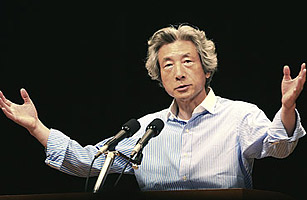
The most interesting thing about Junichiro Koizumi is that he is interesting. Most Japanese Prime Ministers have been dull figures, more suited to backroom politicking than to courting public appeal. Koizumi, 64, has used the mass media, especially television, to project an image of a good-looking, straight-talking maverick. Like all media stars, he has cultivated a style that people can recognize. Admirers call him Lionheart for his flamboyant hairdo as well as his promise to change how things are done. And he may be the first Japanese politician to combine loves of Elvis Presley and Richard Wagner.
In fact, Koizumi, whose grandfather was a Cabinet minister, is hardly an outsider in the political establishment. He was groomed for high office from the moment he could talk. And even though he managed to get a bill passed to privatize the postal system, most of his promised reforms have yet to bear fruit. He has gone his own way and alienated other Asians by continuing to honor the Japanese war dead, including war criminals, at Yasukuni Shrine. His main foreign policy initiative was to send troops to Iraq despite Japan's pacifist constitution. When Koizumi steps down later this year, he will have left at least one mark that successors must contend with: he dragged politics into the age of celebrity. Whoever takes his place can no longer be a colorless hack chosen in a backroom party deal. He or she will have to be genuinely popular, for better or for worse.
Buruma is a professor at Bard College and the author of Inventing Japan: 1853-1964